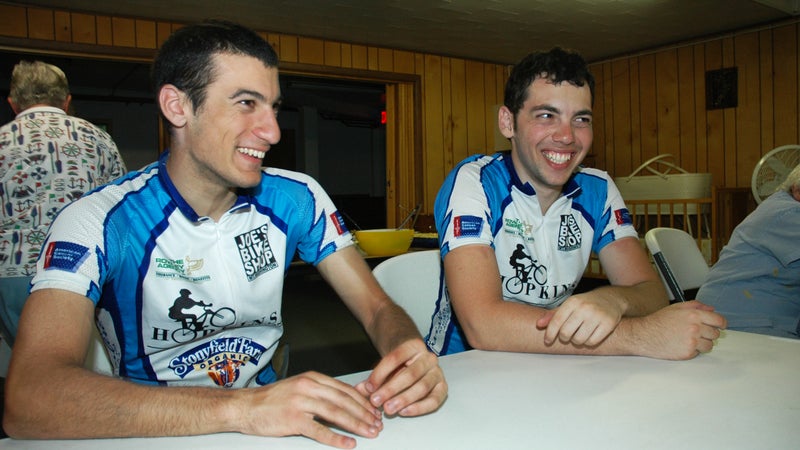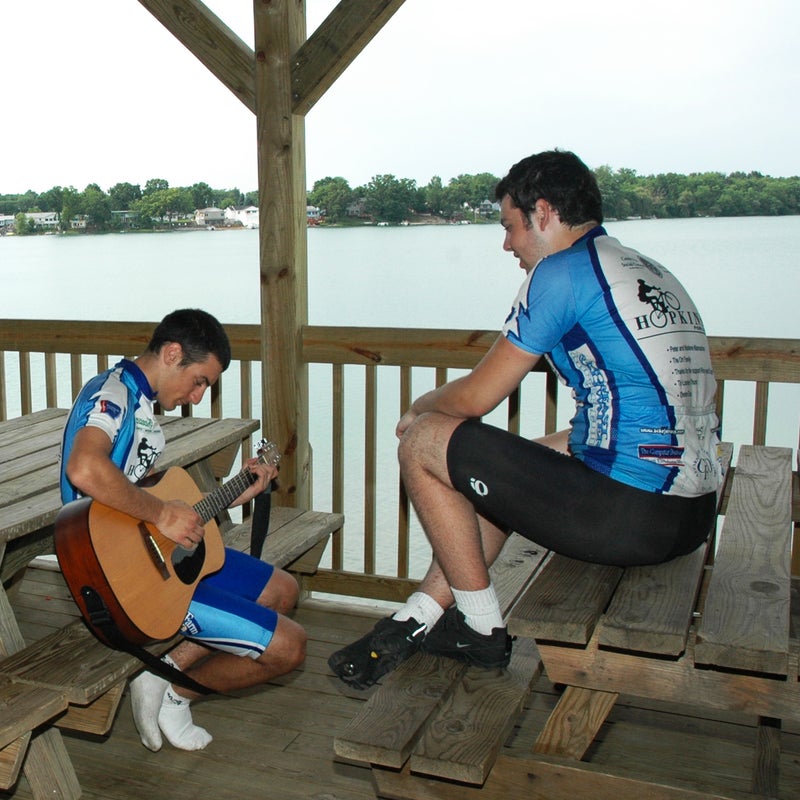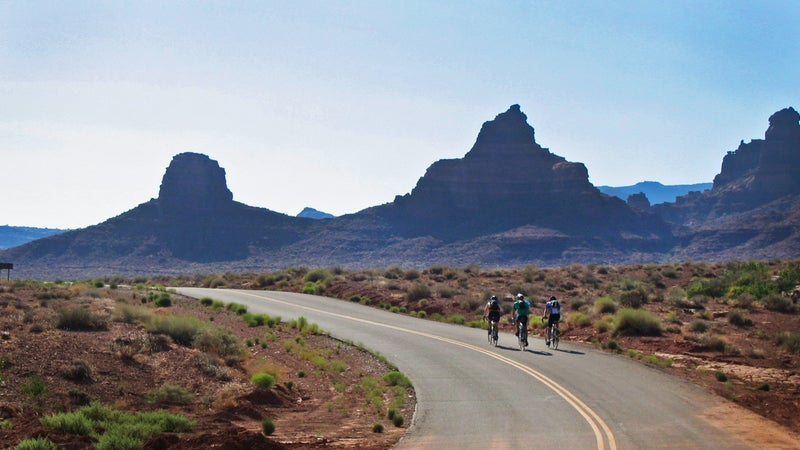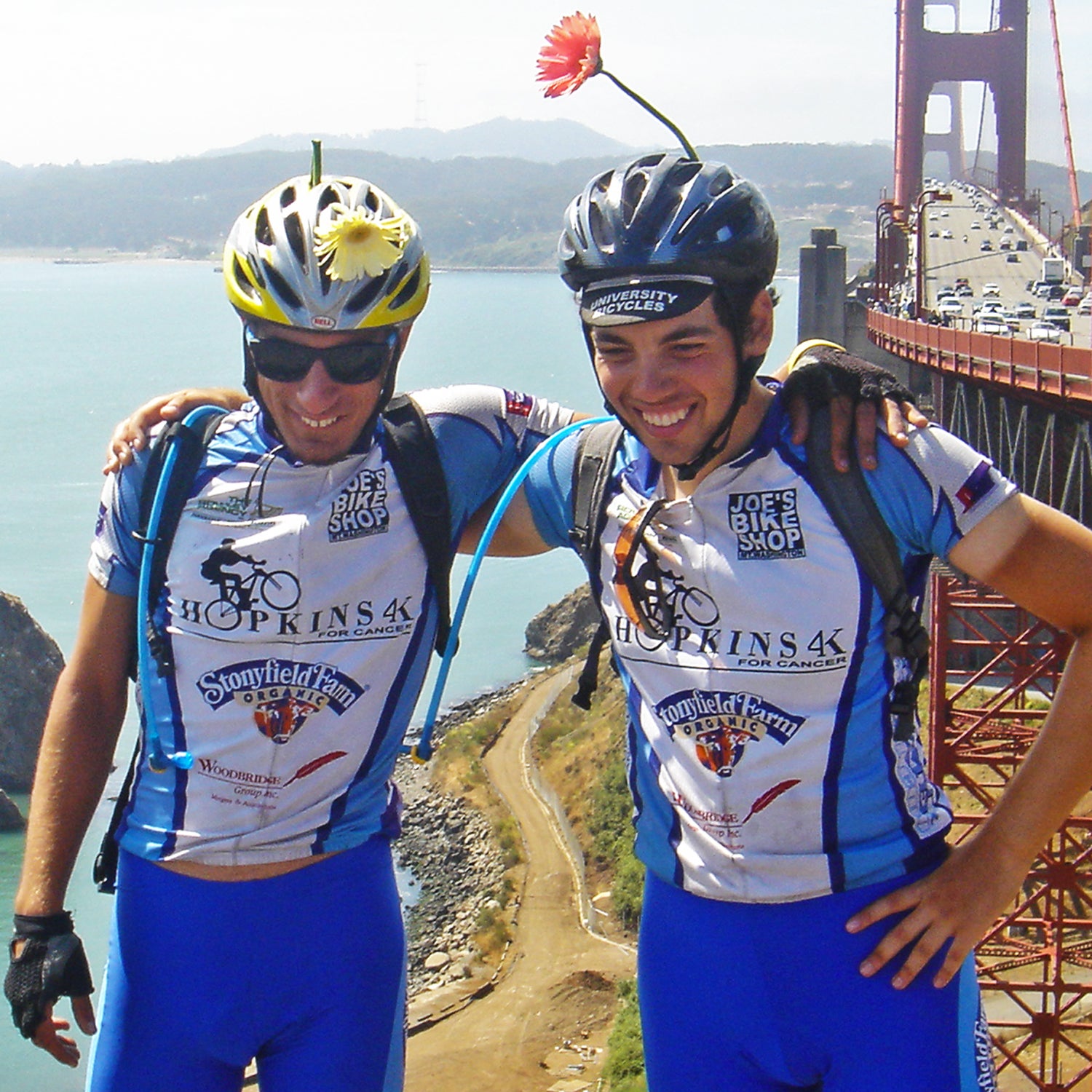My shadow resembled a silhouette painted against an old Appalachian road. It became my companion as I struggled up a solitary mountain incline between the Pennsylvania towns of Bedford and Greensburg.
The mountain didn’t relent. Each turn revealed another punishing stretch to ascend. IĚýshifted my gaze between the road before me andĚýdown at my shaking legs as I strained to put one foot in front of the other. Sweat slid down my forehead. The sun intensified the humid air.
It was the summer of 2006. I was cycling from Maryland to California to raise money for cancer patients, caregivers, and survivors, with a student-led group called Hopkins . Our team had 27 riders—mostly students who attended college in Baltimore, like I did. My Armenian parents had immigrated there from Beirut, Lebanon, in the 1970s. My father worked in the city, and I had a comfortable childhood in the suburbs. During vacations, we often visited our relatives in Lebanon, which was just emerging from 15 years of civil war.Ěý
As I climbed farther up the mountain, I thought about my grandmotherĚýKnarig, a breast cancer survivor who had lived through years of war; I thought about Nayiri, an Armenian family friend from Egypt who had battled ovarian cancer. If our loved ones could endure years of illness, chemotherapy, and social upheaval, what was a steep ride up a mountain?Ěý
Crickets creaked from the roadside pines. Then, a leafy patch of green was interrupted by a blue sign: LOOKOUT POINT MOUNT ARARAT, ALLEGHENY MOUNTAINS, ELEVATION 2,464 FT.
Mount Ararat was not a name I had expected to see in Appalachia. I was familiar with the original: a dormant volcano located in what is now eastern Turkey. The mountain . It represents our connection to Christianity (Armenians formed the first Christian nation in 301 CE) and the indigenous region where we lived for millennia. According to the Book of Genesis, after the Great Flood.Ěý
Seeing a familiar name energized my aching legs, propelling me through the final part of the climb. At the summit, I sat on a mound of dirt and caught my breath, awaiting the other riders. I wondered if the sign had grabbed anyone else’s attention, especially a Turkish-American on the team named Ersin.Ěý
For an Armenian like me, encountering Turkishness—the language, the idea, the people—is fraught. Between 1915 and 1923, the Ottoman Empire (now the Republic of Turkey) , my ancestors among them, in a sustained and brutal genocide. Afterward, Turkey’s government , and there areĚýTurkish people who still believe that it never happened,Ěýeven though it is recognized internationally as historical fact.Ěý
Nearly a century later, as our team rode bicycles across a different continent, that history—and the way it had affected and uprooted generations of my family—made me wary of Ersin. When he reached the summit of this American Mount Ararat, I did not ask if he had seen the sign, though I knew the name would have been significant to him, too.
But I was still thinking about it that evening when our team reached Greensburg, Pennsylvania, where a community group was hosting us for the night in a gymnasium. Sleeping bags littered the floor, and the stench of sweaty socks wafted through the air. Some of my teammates sat in the nearby parking lot running their bike chains through rags to clean the grease. Others played cardsĚýunder a basketball hoop. I strolled along the gym’s sideline when, in the distance, I heard a familiar word: “Baba.”Ěý
“Baba” is what I call my father. I had only ever heard Armenians use the term, but as I looked over toward Ersin, holding a bricklike cellphone in his hand (this was 2006, after all), I realized it must also be used in Turkish. He began to speak other familiar words: janim (my dear), chojookh (child), and fasoolya (beans). I hadĚýnot realized until that moment that our Armenian dialect contained TurkishĚýphrases.ĚýĚýĚý

Turkish was the language of the Ottoman Empire. It was spoken by the government and troops who committed the Armenian Genocide. For my anscestors, the Turkish language was omnipresent throughout that dark time, and it triggered bitter memories. During that period, my great-grandfather Mardiros survived four years of enslavement. In his memoir, in 1978, he wrote of a Turkish teenager brandishing a blade while searching for gyavoors (animals), a derogatory term used to refer to Armenians. My grandparents, Vartan and Yersapet, were among the proud but oppressed Armenian minorities in the Ottoman province of Adana. Like Armenians of that generation, they spoke Turkish and lacked the incentive or security to preserve their mother tongue.
Eventually they moved toĚýLebanon, which gaveĚýArmenian Genocide survivors the chance at a new life and community. A generation later, as a way to retain their native language,Ěýmy father and his classmates in Beirut were told to always speak Armenian, even as they were surrounded by Lebanon’s multilingual world that blended Arabic, French, English, Armenian, and Turkish.Ěý
As I learned this history from my family and in Armenian Sunday school, the narrative slipped into a binary: Turkish perpetrators, Armenian victims. Turkey was guilty, Armenia was innocent. Turks were bad, Armenians were good. I seldom heard a more nuanced perspective. If I had, I’m not sure I would have had the maturity to grasp it.Ěý
But at the time of the cycling trip, I had completed two years of college and grown more open to the world’s complexities. Maybe it was the mindfulness I learned about in a class on BuddhismĚýor the courage I cultivated as a student of theater and writing. More and more, I trusted that questioning assumptions and stepping beyond my comfort zone would spark valuable growth.Ěý
So,Ěýin that American gymnasium, hearing Ersin utter familiar words made me decide to seek our common ground.
During the next day of riding, our team faced a 103-mile haul through the Rust Belt, from Greensburg, Pennsylvania, to Youngstown, Ohio, featuringĚýa strenuous set of rolling hills. We found respite on flat roads separating cornfields, which we shared with Amish horse-drawn buggies. The Appalachians had tested our spirits. On the first day, a teammate had broken her wrist, and on the second day, another teammate’s collarbone suffered a similar fate. At that early stage of the trip, success meant avoiding major injuries and making it to the evenings, when the stories and encouragement of our hosts recharged our spirits. Since our ride had begun in northern Maryland, Pennsylvania was the first full state we crossed. It took three days, and with the Ohio border approaching, the reality of our long adventure was finally setting in. I felt invigorated by how far we had comeĚýand was eager to continue conquering challenges.Ěý
I decided during lunch to broach “the subject” with Ersin. “The subject” was the Armenian Genocide. My stomach tensed as I worried about how he would respond to the topic. Would he scoff? Would he walk away? Would he charm me into believing a lie?Ěý
Until that moment, our conversations had been brief, but aside from his Turkishness, Ersin’s sense of humor and joie de vivre had piqued my curiosity. Once I had resolved to ask him about the genocide, I suddenly became afraid of missing my chance. What if one of us crashed and had to go home? What if our relationship was characterized by superficial banter? I worried about squandering an opportunity to unpack something I’d only read about in booksĚýor heard about through traumatic stories.Ěý

I waited for the final moments of lunch that day before approaching him. Much of the team had dozed off for a quick nap or busied themselves tuning up their bicycles. Ersin sat alone on a shady patch of grass under an oak tree. I joined him and, after some pleasantries, raised the subject.
“Listen, man,” I said, trying to establish a casual tone for an uncomfortable topic. “I, uh, wanted to ask you. You know. Um, your thoughts about the Armenian Genocide. Like, I’m just curious, is it something you’ve heard of? Have you learned about it? I’m just wondering because, you know, I’m Armenian.”
The silence stretched between us, until Ersin started laughing. I joined him. Levity would soon become our way of navigating awkwardness.
“It’s complicated,” Ersin admitted. “You know I’m not even fully Turkish, right? My grandparents are Georgian and Circassian and other stuff, too. That’s common in Turkey. A bunch of people run around pretending they’re full-blooded Turks, when, in truth, most are mixed.”
“I had no idea,” I answered.
“Turkey’s government?” Ersin said, shaking his head. “If they say something’s true, then it’s probably false,Ěýor if they say something’s false, then it’s probably true, unless they’re playing a mind game, which happens often.”
“So what about the genocide?” I pushed.
“Man, I don’t know,” he said, with a tone of exasperation much larger than our conversation. “There’s no doubt that hundreds of thousands of Armenians were murdered during wartime chaos.”Ěý
I had heard that line before. It sounded like the Turkish government’s denialist , a series of whataboutisms that disputed factual evidence.
“Was it genocide?” he continued. “Was it organized from the highest levels of government and carried out by local officials and soldiers? Or was it another act of barbarity in a violent time? I just don’t know. I haven’t seen any evidence that resolves the question.”
I asked Ersin if he had read Peter Balakian’s 2003 book,Ěý. The landmark bestseller used primary sources from Ottoman and American officials to show that the Ottoman Empire’s campaign against Armenians met the of genocide that the United Nations adopted after World War II. Ersin had only heard of the book.
“Maybe after the ride is over, I can send you a copy,” I said.
“I would love that,” Ersin answered. I found myself encouraged by his openness to new ideasĚýand willingness to buck assumptions. My glimpses into Ersin’s personality—curious, creative, compassionate—were confirmed. I began to see his Turkishness the way I saw my Armenianness: not as a total definition, but as an aspect of our identities that we could help one another understand.
In the weeks that followed, our team crossed the Midwest, where the undulating Ozarks gave way to fields of wheat, soy, and livestock. Our anticipation grew as we prepared to climb the mighty Rocky Mountains. In Yuma, Colorado, we caught our first glance of their palatial, snowcapped peaks. At first, I thought they were clouds.
Ersin and I spent more and more time together, exploring the cultural space that we shared: one where Armenia and Turkey intersected in America. In Chicago, we woke up early, gathered trays of extra food donations, and ventured through the neighborhood where our team was staying. On a quiet street lined with elm trees and walk-ups, we gave the food to an unhoused man. We couldn’t fix the traumas and tensions we inherited from our ancestors, but at least we could do something in the moment to make the world just a little less dark.Ěý
We also found relief in humor. In a Nebraska gym, we lobbed basketballs across the court, shouting more common words we shared in Turkish and Armenian: lebleboo! (roasted chickpeas), bashkebozuk! (crazy head), diskotek! During lunch breaks, we sometimes paced around our teammates, pretending to be Old World villagers,Ěýhands tucked behind our backs as we chided everyone in sight.Ěý
“These Americans,” Ersin scoffed with his thickest Turkish villager accent. “Freak dancing and bicycle riding and fundraising. What is this, eh?”
I pretended to be an Armenian American from the mid-Atlantic named JĂro, speaking in gravelly sotto voce and spritzing invisible cologne. Imitating his Turkish father, Ersin scolded JĂro: “You should do something more professional with your summer, like an internship. Where will you get in life spraying cologne and riding a bicycle?”Ěý
“San Francisco!” I answered.
By mid-July, our team reached the deserts of Utah. Red columns of sandstone and massive white domes loomed over us as we emerged from Capitol Reef NationalĚýPark, pedaling through hellish heat toward Grand Staircase-Escalante National Monument. As we rode through the barren, rugged terrain, I tried not to think about the fact that the beauty of the open country also meant a scarcity of resources.Ěý

We spotted a convenience store on a desolate stretch of road and stopped to get provisions. Passing a newspaper stand, I noticed a photograph of a cloud of smoke hanging above a familiar city: Beirut, my parents’ hometown where many of my relatices still lived.
“Israel Bombs Lebanon,” the headline read. As I learned about , and the Hezbollah-led border raid that precipitated it, my stomach turned. I imagined my grandmother sitting in her apartment, knitting a sweater, asĚýher home suddenly flooded with shrapnel and smoke.Ěý
I tried calling my family in Maryland for updates, but there was no stable signal in the desert. I would have to hope for the best until I could speak to someone. During a water stop, my teammates saw that I was upset. I shared the news. In the sweltering heat, few had the bandwidth to commiserate about a conflict half a world away. One American teammate suggested Lebanon asked for it by not properly dealing with Hezbollah. Ersin and I looked at each other. I shook my head. He snickered at how outrageous the comment was.Ěý
Standing there in Utah, I experienced for the first time the visceral disorientation caused by violence impacting my loved ones. But what I felt—separation, confusion, concern—was a sliver of what my family had endured for generations. The safety of my upbringing in Maryland protected me from events that I thought were things of the past, the stuff of family stories: the stray bullet that claimed my uncle’s life during ; my mother watching blood flow down her neighborhood street after a nearby bomb detonated; my great-grandfather surviving a Turkish firing squad that killed 1,000 Armenians in minutes. Looking at that newspaper in the middle of the American desert, I wondered whether it was now my turn to know familial loss and feel helpless. Was this some cruel right of passage that would truly link me to that part of the world, or to my inheritance?
The next day, we rode past the , which featured the 3,000-year-old remnants of an Indigenous community. Though we lacked the time for a proper visit, it reminded me that the land we were crossing, and the country we called America, was, like the land where my ancestors had lived, stolen. The genocide and marginalization of Indigenous people in the Southwest was as brutal and undeniable as the desert sun pounding on our backs.Ěý
But in those arid valleys stretching to the horizon, I noticed no flags, skyscrapers, or placards of national possession. Out there, the ownership of land seemed like a myth used to tame an unconquerable planet with its imposing mountains, endless forests, and hypnotic deserts. We did not own or control the land. We were at its mercy.
The distinguished Armenian American writerĚýĚýhad similar insights while examining the statelessness that Armenians had endured in the wake of genocide and Soviet occupation. “There are only Armenians, and they inhabit the earth, not Armenia, since there is no Armenia,” Saroyan wrote in 1935, decades before Armenia became an independent republic in 1991.Ěý“Since there is no Armenia, gentlemen, there is no America and there is no England, and no France, and no Italy, there is only the earth.” Saroyan was describingĚýthe Armenian experience, but his words had broader implications: If there are no nations, then what do we have? We have our planet. We have ourselves. We have each other. We have a choice: to embrace our common creed as humansĚýor to lose ourselves in the fog of hatred and greed.
Ten days later, a “Welcome to California” sign shook me from the trance of those thoughts. We had almost arrived. The towering Sierra Nevada reminded me that no amount of pontificating in my head would help propel one foot in front of the other. The air thinned. The inclines steepened. It was just me, the mountain, and my shadow, that rocking companion, as we crossed the final mountain range.
Five days after that, from a hill in Marin County, I gazed at San Francisco in the distance. I noticed Victorian homes, Spanish mission–style churches, and the way land and water interlocked. The small building lights twinkling on rolling hills felt familiar, like the view from my grandmother’s fifth-story apartment in Beirut, another city where mountains slope into the sea. The news from Lebanon was that our family emerged unscathed from Israel’s initial bombardments. They were safe, for now.
On the final day, we rode through the neat streets of Sausalito and over the Golden Gate Bridge. Charged with excitement, Ersin and I revisited the characters we inhabited: an Armenian grandmother, a Turkish merchant, a New York loudmouth, a Chicago Casanova, and many others. We had traversed 13 states in two months. I had a new family of fellow cyclists. And in Ersin, I had a brother. Without our ride across America, the generosity of our hosts, the spirit of our teammates, the tenacity of those for whom we rode, and the teachings of nature in every landscape we biked through, I might never have discovered Ersin’s joyful and rich humanity.ĚýOur friendship helped me grasp my inheritance—as an Armenian, as an American, as a human—and to begin the journey of processing it on my own terms. No conflict, division, or border could eclipse the lessons found in friendship, harmony, and nature.ĚýĚý
“I’ll send you that Balakian book in a few weeks,” I said.
Ersin patted me on the shoulder. “Please do.”


